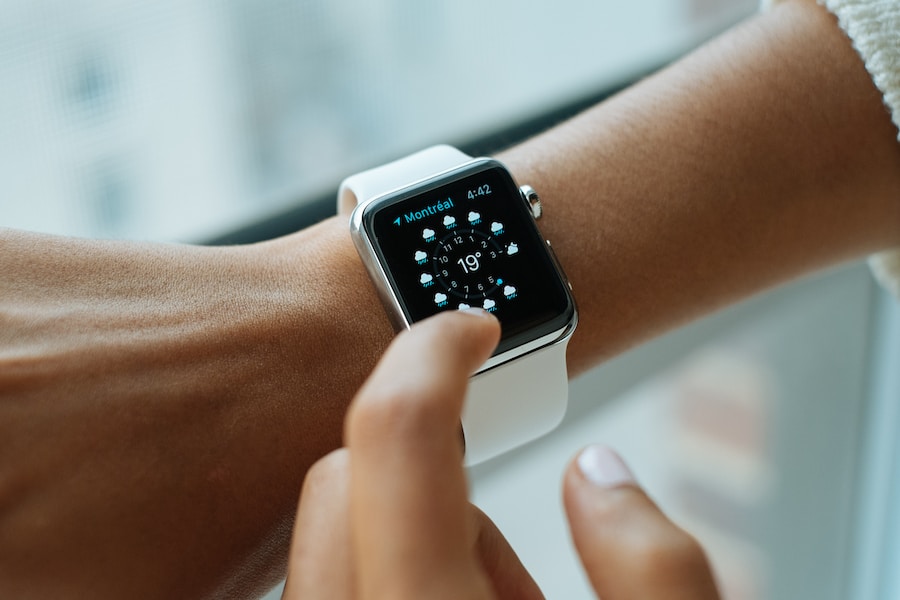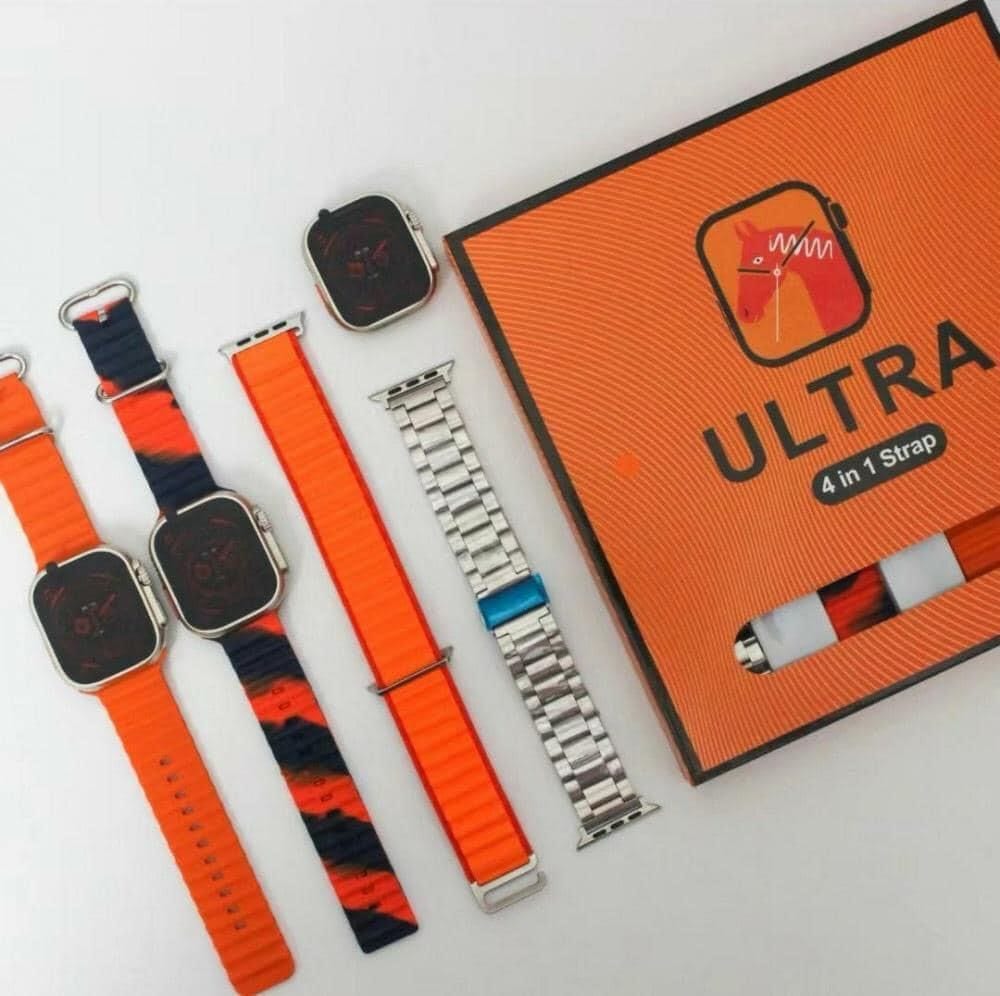Smart Watch Ultra
Original price was: ₨ 5,000.₨ 4,500Current price is: ₨ 4,500.
Description
How Smart Watches are Revolutionizing Fitness Tracking and Health Monitoring
Introduction: The Rise of Smart Watch Ultra in Fitness and Health
Smart watches have come a long way since their inception. Initially, they were primarily used as an extension of smartphones, allowing users to receive notifications and access basic functions on their wrists. However, over the years, smart watches have evolved into powerful fitness and health tracking devices. Today, they have become an integral part of many people’s lives, helping them monitor their fitness goals and overall health.
The popularity of smart watches in the market has skyrocketed in recent years. According to a report by Counterpoint Research, the global smartwatch market grew by 20% in 2020, with Apple leading the way with a 28% market share. This surge in popularity can be attributed to the increasing awareness and importance of fitness and health among individuals. People are becoming more conscious about their well-being and are actively seeking ways to track and improve their fitness levels. Smart watches provide a convenient and accessible solution to meet these needs.
The Benefits of Using
There are numerous advantages to using smart watches for fitness tracking. One of the key benefits is convenience. Unlike traditional fitness trackers, smart watches offer a wide range of features and functionalities all in one device. Users no longer need to wear multiple devices or carry their smartphones while exercising. Smart watches can track steps, distance, calories burned, heart rate, and even provide real-time coaching during workouts. This convenience makes it easier for individuals to stay motivated and committed to their fitness goals.
Another advantage of smart watches for fitness tracking is their accessibility. Smart watches are worn on the wrist, making them easily accessible at all times. This means that users can track their fitness progress throughout the day, not just during dedicated workout sessions. The constant reminder on their wrist serves as a motivation to stay active and make healthier choices throughout the day. Additionally, smart watches often come with companion apps that provide detailed insights and analysis of the user’s fitness data, allowing them to track their progress over time and make informed decisions about their fitness routines.
Smart watches also offer a range of features that make them ideal for fitness tracking. One of the most important features is heart rate monitoring. By continuously tracking the user’s heart rate, smart watches can provide valuable insights into the intensity of their workouts and help them optimize their training. GPS tracking is another useful feature that allows users to accurately track their outdoor activities such as running or cycling. This feature not only provides accurate distance and pace measurements but also allows users to map their routes and explore new areas. These features, combined with the convenience and accessibility of smart watches, make them a popular choice for fitness enthusiasts.
How Smart Watch Ultra are Changing the Way We Monitor Our Health
Smart watches are not just limited to fitness tracking; they are also expanding into monitoring overall health. With advancements in technology, smart watches can now track a wide range of health metrics that were previously only accessible through specialized medical devices. For example, many smart watches now offer sleep tracking capabilities, allowing users to monitor their sleep patterns and gain insights into the quality and duration of their sleep. This information can be invaluable in identifying sleep disorders and making necessary lifestyle changes to improve sleep quality.
Stress monitoring is another health metric that smart watches are capable of tracking. By analyzing heart rate variability and other physiological data, smart watches can provide users with insights into their stress levels throughout the day. This information can help individuals identify triggers and patterns that contribute to stress and take proactive steps to manage it. Additionally, some smart watches offer guided breathing exercises and mindfulness reminders to help users relax and reduce stress levels.
Smart watches are also being used to monitor other health parameters such as blood oxygen levels, menstrual cycles, and even ECG readings. These features enable users to have a better understanding of their overall health and detect any potential issues early on. By providing users with access to this information, smart watches are empowering individuals to take control of their health and make informed decisions about their well-being.
The Role of Smart Watch Ultra in Preventive Healthcare
Smart watches have the potential to play a significant role in preventive healthcare. By continuously monitoring various health metrics, smart watches can help with early detection and prevention of health issues. For example, abnormal heart rate patterns or sudden spikes in blood pressure can be early indicators of cardiovascular problems. With a smart watch, individuals can track these metrics over time and identify any irregularities that may require medical attention. Early detection can lead to timely intervention and potentially save lives.
In addition to early detection, smart watches can also encourage users to adopt healthier habits and lifestyles. Many smart watches come with built-in activity trackers that provide reminders to move and stand throughout the day. These reminders can help individuals break sedentary habits and incorporate more physical activity into their daily routines.
Smart watches can also provide personalized insights and recommendations based on the user’s health data. For example, if a user consistently has poor sleep quality, the smart watch can suggest changes to their bedtime routine or provide tips for improving sleep hygiene.
The Future of Health Monitoring with Smart Watch Ultra
The future of smart watch technology in health monitoring is promising. As technology continues to advance, we can expect to see even more sophisticated features and capabilities in smart watches. One area of potential advancement is blood glucose monitoring. For individuals with diabetes, continuous glucose monitoring is crucial for managing their condition. Smart watches that can accurately measure blood glucose levels non-invasively would be a game-changer for these individuals, eliminating the need for frequent finger pricks and providing real-time data to help them make informed decisions about their diet and medication.
Another area of potential advancement is ECG readings. While some smart watches already offer ECG capabilities, future advancements may allow for more accurate and comprehensive readings. This could enable individuals to monitor their heart health more effectively and detect any abnormalities or arrhythmias early on. Additionally, smart watches may be able to provide more detailed insights into heart rate variability, which can be an indicator of overall health and fitness levels.
The Importance of Accuracy in Smart Watch Ultra Health Tracking
Accurate health tracking is crucial for effective health monitoring. Users rely on the data provided by their smart watches to make informed decisions about their fitness routines and overall health. Therefore, it is essential for smart watch manufacturers to prioritize accuracy in their devices.
To improve accuracy, smart watch manufacturers are constantly refining their sensors and algorithms. For example, heart rate monitoring has significantly improved over the years, with many smart watches now using advanced optical sensors to measure heart rate more accurately.
Manufacturers are investing in research and development to ensure that their devices provide reliable and consistent data across different activities and conditions.
It is also important for users to understand the limitations of smart watch health tracking. While smart watches can provide valuable insights, they should not be considered a substitute for professional medical advice or diagnosis. If users have any concerns about their health, it is always recommended to consult with a healthcare professional.
Smart Watch Ultra and the Rise of Personalized Health Data
One of the key advantages of smart watches is their ability to provide personalized health data to users. By continuously monitoring various health metrics, smart watches can generate insights that are specific to each individual. This personalized data can help users understand their unique health patterns and make informed decisions about their well-being.
For example, a smart watch can provide personalized recommendations for daily step goals based on the user’s activity level and fitness history. It can also provide insights into the user’s sleep patterns and suggest changes to improve sleep quality based on their individual needs.
For example, a user can share their heart rate data with their cardiologist to monitor their heart health remotely. This data can help healthcare professionals make more accurate diagnoses and treatment plans, ultimately improving patient outcomes.
The Impact of Smart Watch Ultra on the Fitness Industry
Smart watches are revolutionizing the fitness industry in several ways. One of the key impacts is the rise of virtual fitness classes. With the COVID-19 pandemic limiting access to gyms and fitness studios, many people turned to virtual workouts as a way to stay active. Smart watches played a crucial role in this shift by providing real-time feedback and tracking during virtual classes. Users could monitor their heart rate, calories burned, and other metrics right from their wrists, enhancing their virtual workout experience.
Another impact of smart watches on the fitness industry is the rise of personalized workout plans. Many fitness companies now offer personalized training programs that integrate with smart watches. These programs take into account the user’s fitness level, goals, and health data to create customized workout plans. Users can then follow these plans using their smart watches, which provide real-time guidance and feedback during workouts. This personalized approach to fitness training has made it more accessible and effective for individuals of all fitness levels.
Smart Watch Ultra and the Integration of Health and Fitness Apps
Smart watches are not standalone devices; they often integrate with health and fitness apps to provide a more comprehensive health tracking experience. These apps allow users to access and analyze their health data in more detail, set goals, and receive personalized recommendations.
For example, popular health and fitness apps like Apple Health and Google Fit integrate seamlessly with smart watches, allowing users to view their health data in one place. These apps provide a holistic view of the user’s health, combining data from various sources such as smart watches, smartphones, and other connected devices. Users can track their activity, sleep, nutrition, and other health metrics all in one app, making it easier to monitor their progress and make informed decisions about their well-being.
In addition to health tracking, smart watches also integrate with fitness apps that offer guided workouts and coaching. These apps provide users with a library of workouts that can be accessed directly from their smart watches. Users can follow along with the workouts, receive real-time feedback on their form and performance, and track their progress over time. This integration of smart watches with health and fitness apps creates a seamless and comprehensive health tracking experience for users.
Conclusion: The Promising Future of Smart Watch Ultra in Health and Fitness Tracking
Smart watches have come a long way in their evolution from simple notification devices to powerful fitness and health tracking tools. Their convenience, accessibility, and range of features make them an ideal choice for individuals looking to monitor their fitness goals and overall health. With advancements in technology, smart watches are expanding beyond fitness tracking to monitor sleep patterns, stress levels, and other health metrics.









